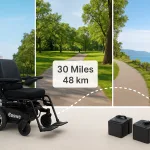For individuals with mobility challenges, an electric wheelchair can offer greater independence and quality of life. Many people wonder: Will Medicare cover the cost of an electric wheelchair? The answer is yes, but there are specific criteria and requirements you must meet in order to qualify for Medicare coverage. Here’s what you need to know about Medicare’s coverage for electric wheelchairs.
1. Medicare Coverage for Wheelchairs
Medicare provides coverage for durable medical equipment (DME) such as wheelchairs if they are deemed medically necessary. Medicare Part B, the outpatient part of Medicare, is responsible for covering electric wheelchairs. However, it’s important to note that not all wheelchairs are covered under Medicare, and coverage depends on certain criteria.
2. Eligibility for Coverage
To qualify for Medicare coverage of an electric wheelchair, you must meet the following requirements:
a. Medical Necessity
Medicare will only cover an electric wheelchair if it is considered medically necessary. This means that you must have a condition that significantly impairs your ability to walk or move, and a manual wheelchair would not be sufficient to meet your needs.
Common conditions that may qualify you for an electric wheelchair include:
- Spinal cord injuries
- Neurological disorders (e.g., Parkinson’s disease, multiple sclerosis)
- Severe arthritis
- Stroke
- Other conditions causing severe mobility limitations
Your doctor will need to certify that an electric wheelchair is necessary for your condition and will help you maintain a better quality of life by allowing you to perform daily tasks more easily.
b. Doctor’s Prescription
A doctor’s prescription is essential. You must see a doctor who will assess your mobility needs and provide a written order for an electric wheelchair. The prescription must specify that you require the wheelchair for use inside your home. Medicare generally does not cover wheelchairs for outdoor-only use.
c. Functional Assessment
Your doctor will also likely conduct a functional assessment to evaluate your ability to move around your home. This assessment helps determine if an electric wheelchair is necessary. The healthcare professional will evaluate factors such as:
- Your ability to walk and move
- Your ability to perform activities of daily living, like getting in and out of bed or using the bathroom
- Whether you can safely use a manual wheelchair
d. Inability to Use a Manual Wheelchair
Medicare will typically cover an electric wheelchair only if you are unable to use a manual wheelchair. If you can use a manual wheelchair but need assistance with long distances or outdoor mobility, Medicare may not approve coverage for an electric wheelchair. However, if your condition prevents you from operating a manual wheelchair effectively, an electric wheelchair may be considered necessary.
3. How Medicare Pays for Electric Wheelchairs
Medicare does not pay for the full cost of an electric wheelchair, but it will cover a portion of the expenses. Here’s how the payment process typically works:
a. Medicare’s Contribution
Medicare generally pays 80% of the approved amount for a motorized wheelchair under Medicare Part B. However, this only applies if the wheelchair is considered durable medical equipment (DME) and is prescribed by a doctor.
b. Your Out-of-Pocket Costs
You will be responsible for paying the remaining 20% of the cost. This is your coinsurance. Depending on your situation, this amount can be significant, so you may want to check whether you have secondary insurance or a Medigap policy to help cover the remaining costs.
c. Medicare Advantage Plans
If you have a Medicare Advantage Plan (Part C), your coverage for an electric wheelchair may vary. Most Medicare Advantage Plans provide similar coverage to Medicare Part B, but it’s important to check with your plan provider to ensure that they cover electric wheelchairs and to understand any additional requirements or costs.
4. The Process of Getting an Electric Wheelchair through Medicare
Here’s a step-by-step guide to how the process generally works:
- Consult with Your Doctor: Schedule an appointment with your doctor to discuss your mobility needs. If your doctor determines that you need an electric wheelchair, they will write a prescription.
- Obtain a Functional Assessment: You may need to undergo a functional assessment with a healthcare provider, such as an occupational therapist, who will assess your ability to move and perform daily activities.
- Find a Medicare-Approved Supplier: You will need to find a supplier that is enrolled in Medicare and is authorized to provide electric wheelchairs.
- Submit the Necessary Documentation: Your doctor will submit the required paperwork to Medicare, which includes the prescription and any medical records necessary to demonstrate that you need an electric wheelchair.
- Medicare Review and Approval: Medicare will review your case and determine if you qualify for coverage. If approved, they will pay 80% of the approved cost, and you will be responsible for the remaining 20%.
Conclusion
Medicare can pay for an electric wheelchair if it is deemed medically necessary and prescribed by your doctor. You must meet specific criteria to qualify, including a functional assessment, the inability to use a manual wheelchair, and a prescription from a doctor. While Medicare will cover 80% of the cost, you will be responsible for the remaining 20%, unless you have additional insurance or coverage through a Medicare Advantage plan.





















